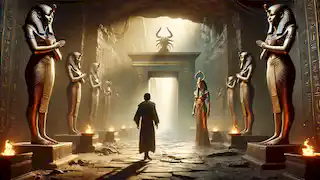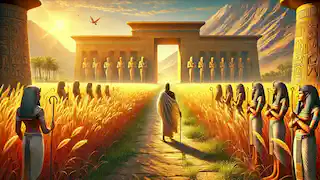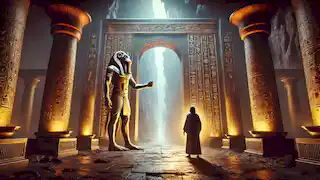In the ancient land of Kemet, where the sun god Ra sailed across the sky each day and the Nile brought life to the fields, there was a belief that death was not the end but a transition. The Egyptians knew that upon passing from this world, they would embark on a journey through the underworld, a place of mysteries known as the Duat. At the heart of this journey stood a crucial moment—one where the soul would be judged, and the fate of eternity decided. This sacred process was the "Weighing of the Heart," overseen by the jackal-headed god, Anubis, the guide of the dead and protector of tombs. The story begins with the soul of a man named Akhen, who had lived a full life in the bustling city of Thebes. He had been a scribe, recording the events of pharaohs and noblemen, ensuring their stories were immortalized. But now, his time among the living had come to an end. As his body lay wrapped in fine linen within the darkness of his tomb, his soul, the *ka*, awakened to a new existence. In this realm of shadows and spirits, Akhen found himself in the presence of a being he had seen only in temple carvings and sacred texts—Anubis, the god with the black jackal’s head. His eyes glowed with a faint, otherworldly light as he held a golden staff in one hand. “You are summoned,” Anubis said, his voice a deep, resonant tone that seemed to echo through the air itself. “The Weighing of the Heart awaits you.” Akhen felt a mixture of fear and awe. He knew this moment would come, as every Egyptian did, but now that he stood before the gatekeeper of the afterlife, the gravity of it weighed upon him. His heart beat steadily in his chest, but soon, it would be measured against the feather of Ma’at, the goddess of truth and justice. Should his heart be heavier than the feather, his soul would be devoured by the monstrous Ammit, and he would cease to exist forever. Silently, Anubis led Akhen through a winding path shrouded in shadows, deeper into the Duat. The ground beneath them shifted like soft sand, and strange whispers filled the air as spirits of the dead passed them by. As they approached a grand hall, its towering pillars illuminated by a faint, golden glow, Akhen could see the scales of justice ahead. In the center of the hall stood a massive set of scales, perfectly balanced and glinting in the dim light. At one end of the scales sat the sacred feather of Ma’at, pure and weightless. At the other end, Akhen knew, his heart would soon be placed. Akhen’s breath caught in his throat as he saw the gods assembled in the Hall of Two Truths. Osiris, lord of the underworld, sat upon a majestic throne, his green-skinned form wrapped in regal robes. His hands held the crook and flail, symbols of kingship and judgment. Flanking him were the goddess Isis, with her wings of protection, and Nephthys, her sister, offering solemn support. Thoth, the ibis-headed god of wisdom, stood ready with a scroll in hand, prepared to record the outcome of the judgment. The scene was overwhelming, and Akhen’s heart pounded with nervous anticipation. He knelt before the gods, his head bowed low in reverence. “Akhen of Thebes,” Osiris spoke, his voice calm but commanding. “You have lived your life, and now you stand before us to face judgment. Your heart, the seat of your intentions, your deeds, and your truth, will be weighed against the feather of Ma’at.” Akhen nodded, too overwhelmed to speak, as Anubis approached with a gentle yet firm hand upon his shoulder. The god held a small golden blade, and with it, he delicately reached into Akhen’s chest, removing his heart without pain or blood. The heart, still beating softly, rested in Anubis’s hands as he carried it to the scales. The moment of truth had arrived. As the heart was placed on one side of the scales, the feather of Ma’at remained weightless on the other. Time seemed to stretch infinitely as Akhen watched, praying silently to the gods that his heart would not tip the balance toward oblivion. {{{_02}}} The scales wavered for a moment, tipping ever so slightly. The tension in the hall was palpable as all eyes were fixed on the movement. Thoth, ever watchful, began to make notes on his scroll, his pen scratching lightly against the parchment. Anubis’s expression remained unreadable, and Akhen dared not move as the gods considered the verdict. His life’s deeds, both good and ill, weighed upon the scales in a delicate balance. He thought of the moments of kindness he had shown to others, the times he had shared wisdom with his fellow scribes, and the records he had meticulously preserved. But he also thought of his failings—the moments of selfishness, the mistakes he had made, and the times when his own ambitions had clouded his judgment. Suddenly, the scales came to a stop, perfectly balanced. Osiris stood, his regal form towering above the assembly. “Akhen of Thebes, your heart has been found true. You have lived a life in harmony with Ma’at’s principles. You are granted passage into the Field of Reeds, the eternal paradise where you shall dwell in peace.” Akhen felt a flood of relief wash over him. He had passed the test. His soul would not be cast into the void. Instead, he would join the righteous in paradise, where he would be reunited with his ancestors and live in eternal bliss. But before he could fully embrace the joy of his verdict, Anubis raised a hand, his eyes serious. “Before you go, there is something you must understand.” Akhen turned to the god, confusion flickering across his face. “What is it, Lord Anubis?” “Your journey is not yet complete,” Anubis replied. “To reach the Field of Reeds, you must cross the Twelve Gates of the Duat. Each gate is guarded by powerful deities, and they will test your strength, wisdom, and virtue one final time.” Akhen nodded, knowing that his trials were not yet over. Anubis led Akhen once more, this time through the twisting, shadowed pathways that would bring him to the Twelve Gates. Each gate was a portal of light, guarded by a fierce deity or spirit, waiting to challenge any soul that approached. At the first gate stood the goddess Serqet, her scorpion crown gleaming in the dim light. She eyed Akhen warily, her voice sharp as she asked, “What have you brought with you from the land of the living? Show me your worth.” Akhen thought carefully, reaching into his mind for the answer that would please the goddess. “I bring the knowledge I have gathered through my life’s work,” he replied. “I have written the deeds of men and the stories of gods, preserving them for eternity.” Serqet nodded, satisfied with his answer, and stepped aside, allowing him to pass. The second gate was guarded by Hapi, the baboon-headed god who controlled the Nile’s floods. His voice boomed like thunder as he asked, “What have you learned from the river’s eternal flow?” Akhen knew that the answer lay in understanding the balance of life and nature. “I have learned that, like the river, life is a cycle. It brings life and nourishment but can also bring destruction. To live in harmony with the gods is to understand that balance.” Hapi grinned and waved him through. And so it went, as Akhen faced the challenges of each gate. He encountered the lion-headed goddess Sekhmet, the cobra goddess Wadjet, and the hawk-headed Horus, each testing his knowledge, courage, and purity. At every turn, Akhen drew upon his wisdom and the lessons of his life, passing through the gates one by one. At last, after crossing the final gate, Akhen stood before a vast field that stretched as far as the eye could see. The Field of Reeds, lush and verdant, was bathed in the warm glow of an eternal sun. In the distance, he could see the figures of his ancestors, waiting to welcome him. Akhen stepped into the Field of Reeds, his heart filled with peace. The trials were over, and his place in the afterlife was secured. The gods had judged him fairly, and he had proven himself worthy of their blessing. His ancestors greeted him with open arms, and for the first time in many years, Akhen felt whole. The worries of the living world had faded away, replaced by the tranquility of this eternal paradise. As he wandered through the fields, he marveled at the beauty around him—the golden reeds swaying in the breeze, the crystal-clear waters that ran through the land, and the eternal sun that warmed his face. Here, in the land of the gods, Akhen would spend eternity in joy and peace, surrounded by those he had loved in life. His heart, having been weighed and found true, had granted him the ultimate reward—a place in the eternal paradise of the gods.The Call to the Duat

The Tribunal of Gods
The Judgment
The Gates of the Duat

The Eternal Reward

The Tale of Anubis and the Weighing of the Heart
Reading Time: 8 min

About Story: The Tale of Anubis and the Weighing of the Heart is a Myth Stories from egypt set in the Ancient Stories. This Dramatic Stories tale explores themes of Justice Stories and is suitable for All Ages Stories. It offers Cultural Stories insights. A soul’s journey through the Duat to earn eternal peace in ancient Egypt.
















